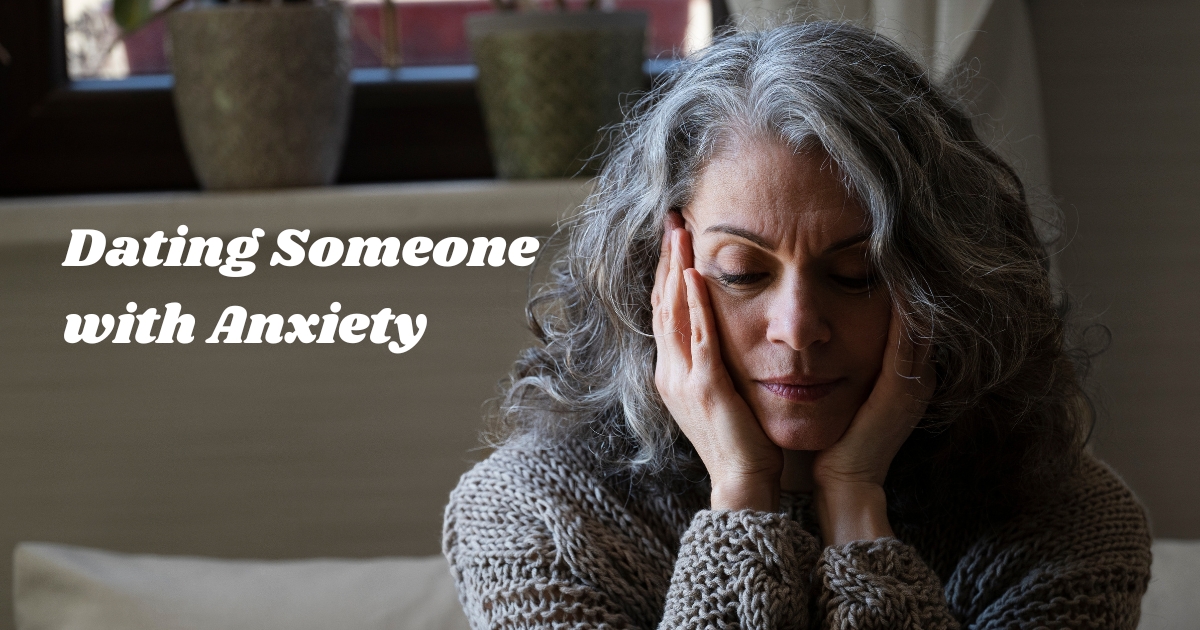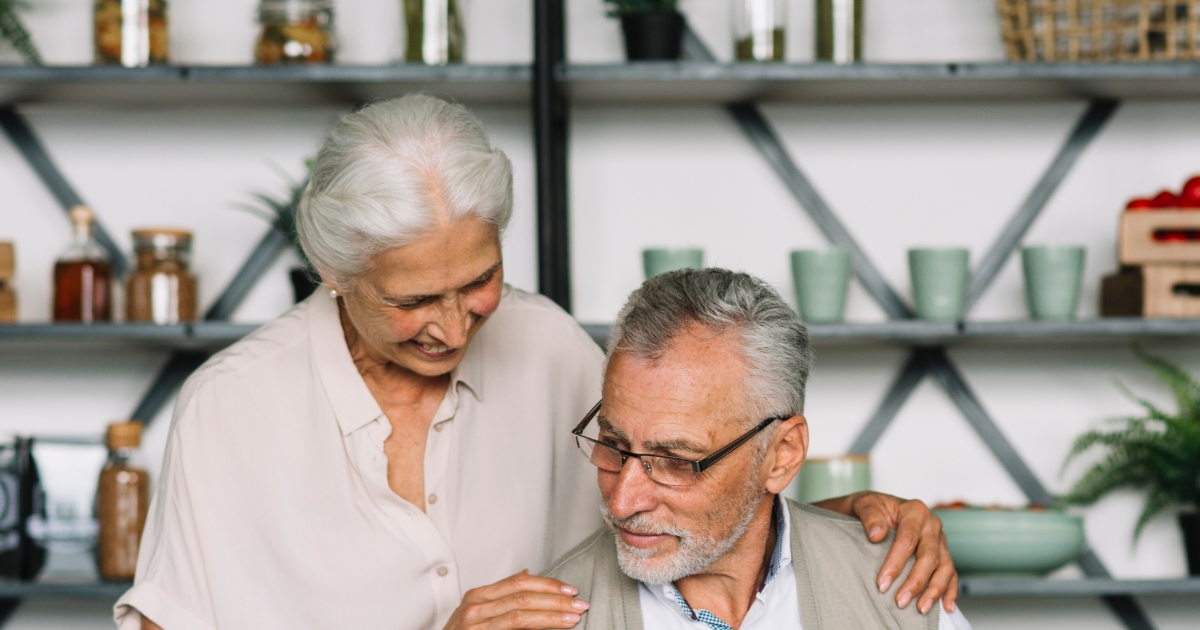
Dating Someone with Anxiety: How to Be a Supportive Partner
Love doesn’t come with an instruction manual, especially when you’re dating someone with anxiety. If you’re over 50 and back in the dating world, you might find yourself navigating relationships with added layers of complexity. But here’s the good news: dating someone with anxiety can lead to incredibly meaningful and deep connections.
Understanding anxiety and learning how to be supportive isn’t just about being a good partner – it’s about creating a relationship where both of you can thrive. With patience, empathy, and the right approach, you can build something beautiful together, regardless of the challenges anxiety might bring.
What Is Anxiety and How Does It Affect Relationships?
Anxiety affects about 40 million adults in the United States, making it one of the most common mental health conditions. For mature adults, anxiety can stem from various sources – health concerns, financial worries, or even the vulnerability that comes with opening your heart again after loss or divorce.
In relationships, anxiety often shows up as overthinking. Your partner might replay conversations in their mind, worry about saying the wrong thing, or fear that you’ll leave them. They might seem restless during dates or need extra reassurance about your feelings.
Physical symptoms are common too. You might notice your partner experiencing rapid heartbeat, sweating, or feeling dizzy during stressful moments. Some people with anxiety avoid certain situations altogether, like crowded restaurants or social gatherings.
The key thing to remember is that anxiety isn’t a choice. It’s not something your partner can simply “turn off” or “get over.” Research shows that anxiety has real biological and psychological roots. When you understand this, you can approach your relationship with more compassion and less frustration.
The Importance of Open Communication
Communication forms the foundation of any healthy relationship, but it’s especially crucial when supporting a partner with anxiety. Creating a safe space for honest conversation can transform your relationship dynamic entirely.
Start by asking open-ended questions like “How can I best support you when you’re feeling anxious?” or “What helps you feel most comfortable?” Listen without trying to solve everything immediately. Sometimes, your partner just needs to feel heard and understood.
Be patient when they struggle to express their feelings. Anxiety can make it hard to find the right words or organize thoughts clearly. Give them time to process and respond. Avoid phrases like “just relax” or “don’t worry about it” – these well-meaning comments can actually make anxiety worse.
One effective approach is establishing regular check-ins. Set aside time each week to talk about how you’re both feeling in the relationship. This prevents small concerns from building into bigger issues and shows your partner that their emotional well-being matters to you.
Remember that relationship tips for anxiety often emphasize timing. Choose calm, private moments for deeper conversations rather than discussing sensitive topics during stressful situations.
Patience Is Key: Avoid Trying to ‘Fix’ Them
One of the biggest mistakes well-meaning partners make is trying to “cure” their loved one’s anxiety. This approach, while coming from a place of love, can actually damage the relationship and make your partner feel inadequate or broken.
Anxiety isn’t something that needs fixing – it’s something that needs managing. Your role isn’t to be a therapist but to be a supportive companion on their journey. Studies show that people with anxiety respond better to acceptance than to attempts at elimination.
Practice patience when plans change suddenly. Your partner might need to cancel dinner because they’re having a particularly anxious day. Instead of taking it personally, offer understanding and suggest alternative ways to spend time together, like a quiet evening at home.
Supporting a partner with anxiety means celebrating small victories. Maybe they tried a new restaurant despite their social anxiety, or they opened up about a fear they’d never shared before. Acknowledge these moments without making a big deal that might feel overwhelming.
Learn to recognize your own limits too. It’s natural to feel frustrated sometimes, and that’s okay. The important thing is not to let that frustration leak into your interactions. Take care of your own mental health so you can be truly present for your partner.
Respecting Boundaries and Personal Space
Healthy boundaries are essential in any relationship, but they’re especially important when dating someone with anxiety. Recognizing and honoring these boundaries helps your partner feel safe and valued, while also keeping your connection strong.
Here are some key ways to respect boundaries and personal space:
- Give your partner regular alone time to recharge—it’s not a rejection, just self-care.
- Identify triggers together, such as crowded places or last-minute plan changes, and find ways to work around them.
- Be open about your own needs, like reassurance or advance notice of changes, to keep things balanced.
- Move at a comfortable pace with physical intimacy, and discuss what feels right for both of you.
- Use honest conversations to build trust, even if discussing boundaries feels a bit awkward at first.
Remember, boundaries aren’t set in stone. They can shift as your relationship grows, so keep talking, stay flexible, and check in with each other regularly. This openness will make your relationship more balanced and supportive.

How to Support Their Coping Strategies
Supporting a partner with anxiety requires patience, understanding, and a willingness to learn. Everyone copes with anxiety differently, so your role is to assist and encourage their strategies without trying to take over. By offering thoughtful support, you can help them manage their anxiety more effectively.
Here are some ways you can support a partner with anxiety:
- Learn about their coping strategies: Understand their preferred methods, such as exercise, meditation, or breathing techniques, and find ways to participate when appropriate. For example, go for walks together, try a yoga class, or create a quiet space for meditation.
- Support professional treatments: If your partner works with a therapist or takes medication, always encourage these treatments. Avoid suggesting changes to their therapy or medication without consulting a healthcare provider.
- Offer consistency and reliability: Many people with anxiety benefit from routine and predictability. Be dependable in your communication and plans. If changes are necessary, give advance notice and explain why.
- Understand their specific type of anxiety: Social anxiety, generalized anxiety disorder, and other types of anxiety require different approaches. Educating yourself about their condition can help you provide more tailored support.
- Promote their hobbies and interests: Encourage activities they enjoy, like gardening, reading, or crafting, which can naturally reduce anxiety. These moments can also strengthen your bond by creating opportunities for quality time.
By being supportive, reliable, and informed, you can play a key role in helping your partner manage their anxiety. Small acts of encouragement and understanding can make a big difference in their journey toward better mental health. Together, you can build a stronger and more compassionate relationship.
Building a Strong Foundation Together
Building a healthy relationship while dating someone with anxiety starts with intentional actions and genuine care. By focusing on trust, empathy, and consistent support, you set the stage for a lasting and rewarding partnership. Here are some effective ways to foster trust and deepen your connection:
- Show up when you say you will, and follow through on your promises.
- Communicate openly about your own feelings and listen actively to your partner.
- Celebrate your partner’s strengths and small victories, however minor they seem.
- Offer reassurance during challenging moments without judgment.
- Encourage mutual support by sharing your own needs and boundaries.
- Make time for activities you both enjoy and create positive shared experiences.
These steps go a long way toward building trust and security in your relationship. Remember, the journey of supporting a partner with anxiety can help you both grow in empathy and understanding, ultimately enriching your connection and making your relationship even stronger.
Moving Forward with Love and Understanding
Dating someone with anxiety doesn’t have to limit your relationship—it can strengthen it. By approaching anxiety with curiosity, patience, and understanding, you create space for deeper intimacy and connection. Everyone deserves love and companionship, regardless of mental health challenges, and your willingness to adapt and support your partner demonstrates the maturity that makes relationships truly special.
The keys to a healthy relationship—communication, respect, patience, and support—benefit every couple, whether anxiety is part of the equation or not. Take things one day at a time, celebrate the good moments, and seek professional guidance if needed. Love after 50 can be incredibly rewarding when built on understanding and genuine care, creating strong, resilient bonds.











